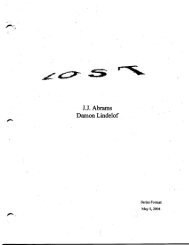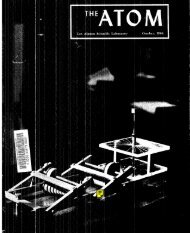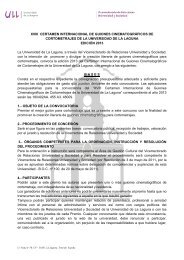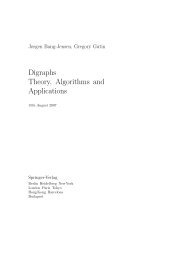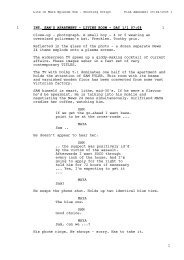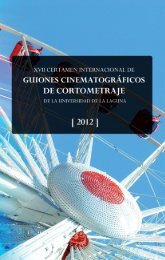Create successful ePaper yourself
Turn your PDF publications into a flip-book with our unique Google optimized e-Paper software.
Figure 3<br />
This root could well be negative, if<br />
vo > Zuo-that is, if the spacecraft<br />
are approaching so quickly that<br />
the missile doesn't have enough<br />
time to reach a velocity corresponding<br />
to the maximum kinetic<br />
energy:<br />
vo<br />
r/ _Zmouf,e"o<br />
-.max<br />
2<br />
e<br />
Finally, we obtain the required<br />
distance so by substituting r in the<br />
expression for s(t):<br />
s(r) : o,<br />
to- "^-4uZ-v3=5km.<br />
2o<br />
Thus, we have imagined and<br />
solved two problems using equation<br />
(3), yet how different they are<br />
in their aimsl One is for help, the<br />
other for harm, and both use the<br />
most advanced technology. Are<br />
human beings destined to tread a<br />
vicious circle of creation and de'<br />
struction forever, despite our ever<br />
growing knowledge? Were our<br />
greatest minds right to be pessimistic?<br />
"Perfected methods and unclear<br />
purposes-these are, to my mind,<br />
the characteristics of our time."<br />
(Albert Einstein, The Common Language<br />
of Sciencel<br />
"Our winged thoughts turn into<br />
poultry." (Henry David Thoreau|<br />
"Adhering to old practice, we<br />
again consider science as merely a<br />
new way to obtain the same old<br />
things, bread and arable land. We<br />
yoke Pegasus to the plow." (Pierre<br />
Teilhard de Chardin)<br />
Still, there is some hope. First of<br />
all, there is the very existence of<br />
{light, which is somewhat more<br />
than just a transiti.on from point A<br />
to point B. Do you remember what<br />
you felt the first time you f1ew,<br />
watching clouds beneath and the<br />
abyss above, fu1l of stars and the<br />
shining Sun? (Physicists have<br />
wanted to fly from time immemorial,<br />
it seems, beginning with<br />
Daedalus-surely he was a physicist?-and<br />
his disobedient son<br />
Icarus.) For example, in 1783 |acques<br />
Alexander Caesar Charles, an expert<br />
in the laws of gases/ constructed a<br />
balloon just after the Montgolfier<br />
brothers. Charles filled his with hydrogen<br />
and made several flights, including<br />
one over the Alps. In 1804<br />
|oseph Louis Gay-Lussac made two<br />
flights in a balloon and reached an<br />
aititude of 7 km. In 1887 Dmitry<br />
Mendeleyev, who devised the periodic<br />
table of the elements, made a<br />
solo flight in a balloon to observe a<br />
solar eclipse (he was in his forties at<br />
the time).<br />
But the person who discovered the<br />
remarkable equation (3) above-what<br />
was he thinking about? Indeed, why<br />
would a provincial schooi teacher be<br />
drawn to outer space from the green<br />
pastures and forests, neglecting dayto-day<br />
life and spending most of his<br />
income on experiments and pdvate<br />
publication of his works, which<br />
were rejected at the time by almost<br />
everyone? We can't ascribe it all to<br />
a maniacal striving for worldly<br />
glory-everything in his work is so<br />
right and so fruitful. His motivation<br />
must lie deeper.<br />
In his diaries he complained that<br />
people considered him "just a onesided<br />
mechanic, not a thinker. A<br />
rocket for me is only a means/ a<br />
method for penetrating into outer<br />
space." But why? And then, step by<br />
step/ a suspicion arises that every<br />
$eat thinker tries to solve some<br />
superproblem that lies far beyond<br />
common sense. The discovery of<br />
such a superproblem is a most important<br />
f.actor in the history of science<br />
and a most useful element in<br />
teaching.<br />
In the history of Russian astronautics<br />
one can discern a chain of<br />
shining personalities and memorable<br />
events-logically connected<br />
links amid the jumble of persons<br />
and occurrences. Let's begin with<br />
N. F. Fyodorov (1828-1903), the illegitimate<br />
son of Prince Gagarin<br />
and the librarian of the Rumyantsev<br />
Museum. Fyodorov was "a modest,<br />
unpretentious philosopher in old,<br />
shabby, but still tidy clothes" who<br />
published almost none of his meditations<br />
duringhis lifetime. What occupied<br />
his mind? Nothing less than<br />
physical, corporal immortality, and<br />
not only that of futwe generations<br />
whose science will have reached the<br />
required level (this would have been<br />
understandable but selfish on their<br />
part), but also of past generationsin<br />
a word, the resurrection of the<br />
fathers. He saw this as the main<br />
purpose of science, and he even demanded<br />
that universities be built in<br />
cemeteries so that students would<br />
not waste their time on trifles, but<br />
think about the victory of life over<br />
death.<br />
Just as our modern terminology<br />
divides all science into "basic" and<br />
OUAIIITU]ll/fIIIURE 23



